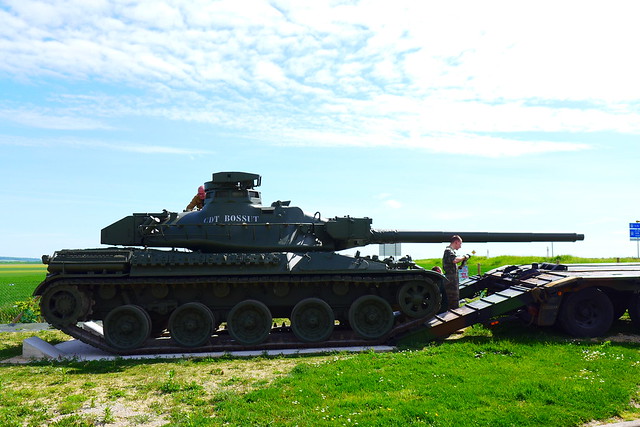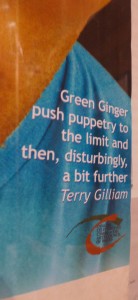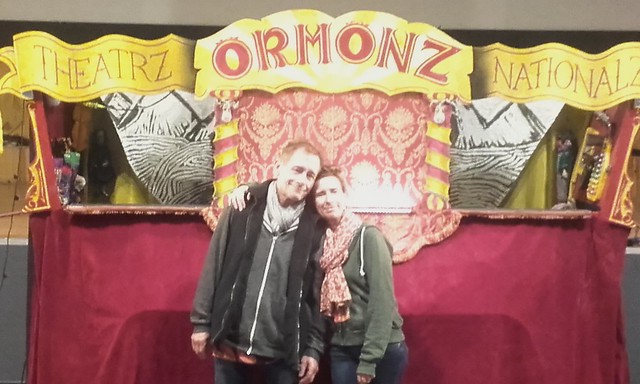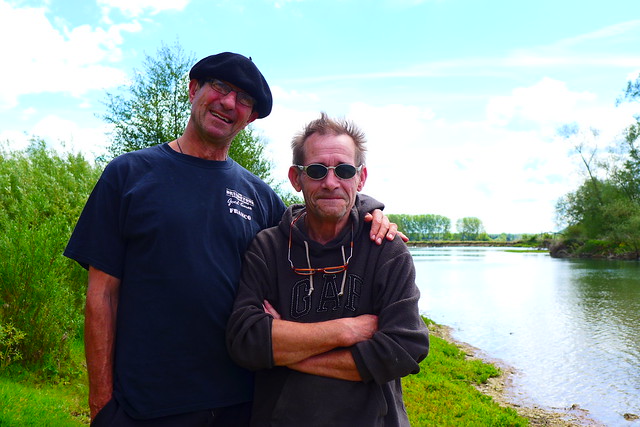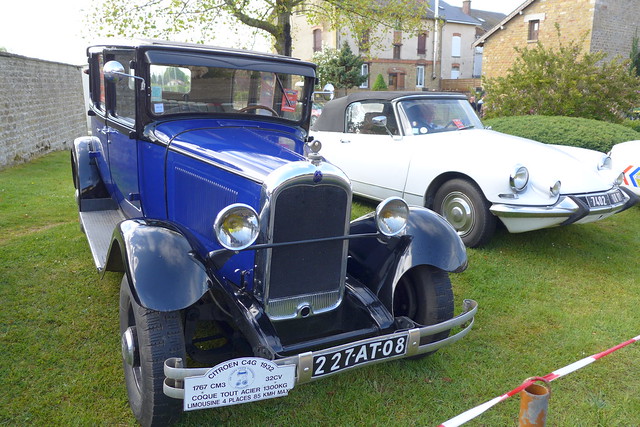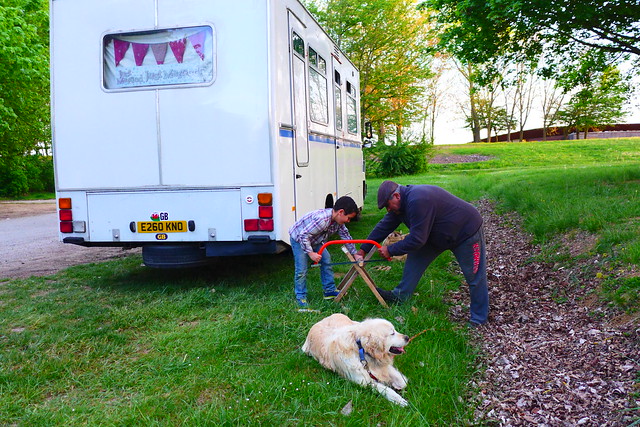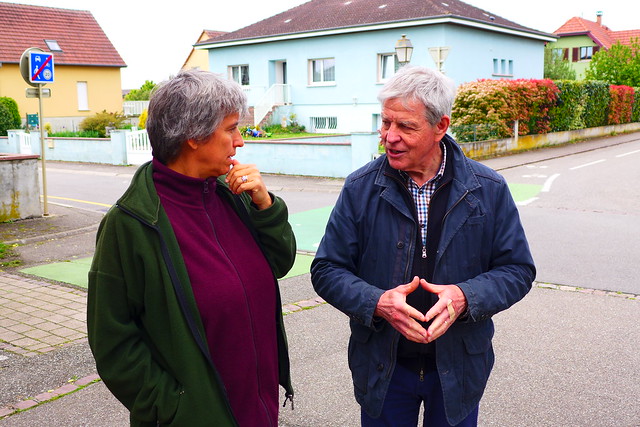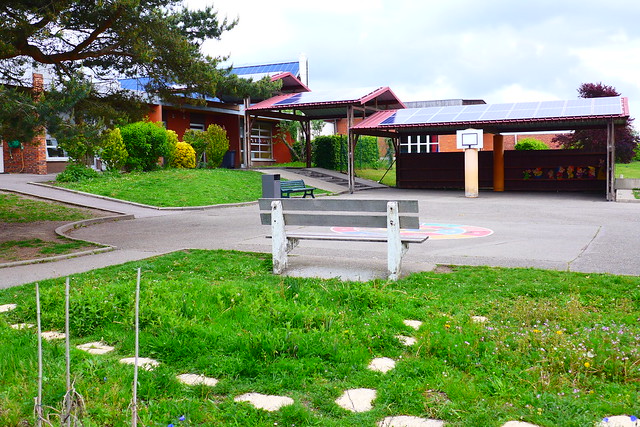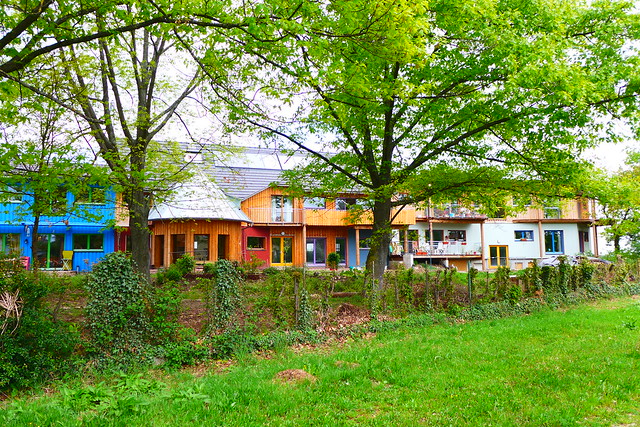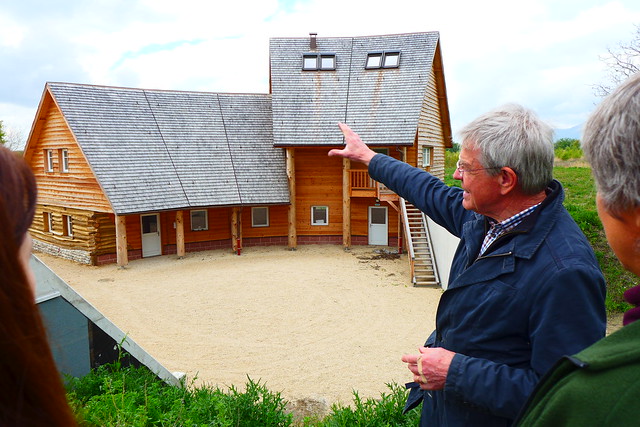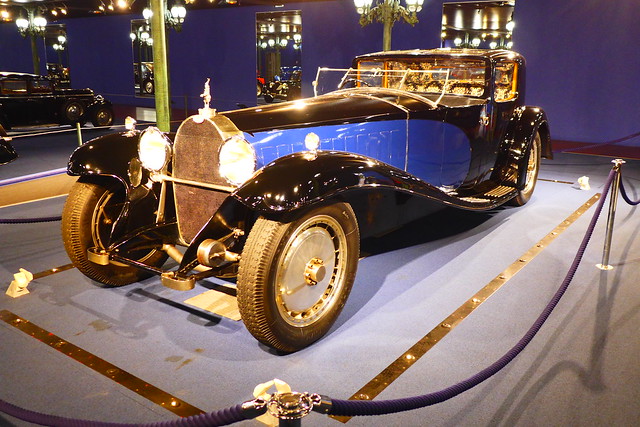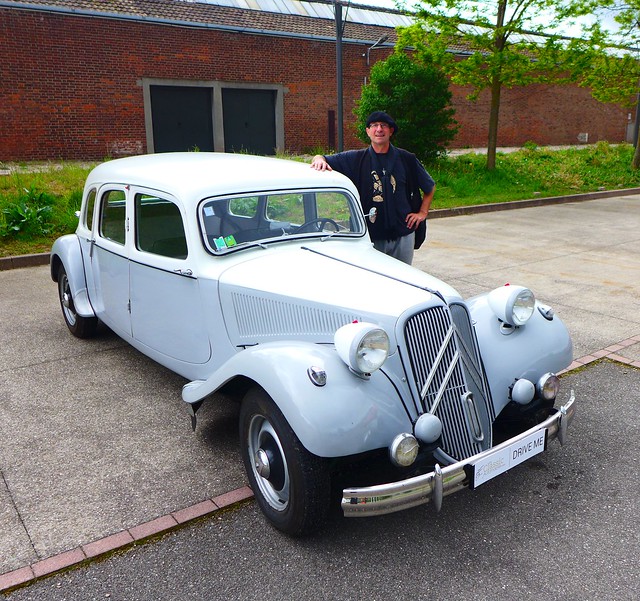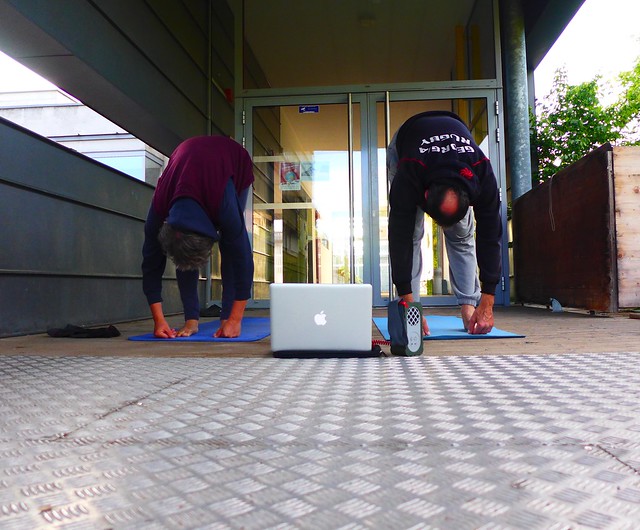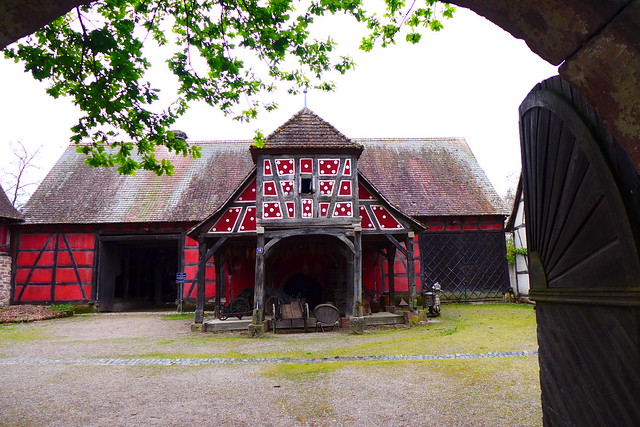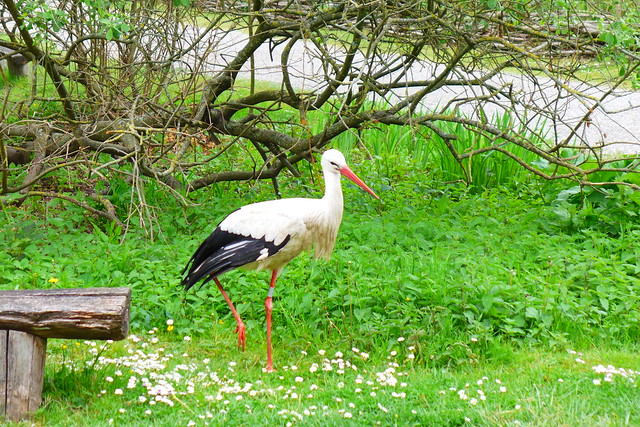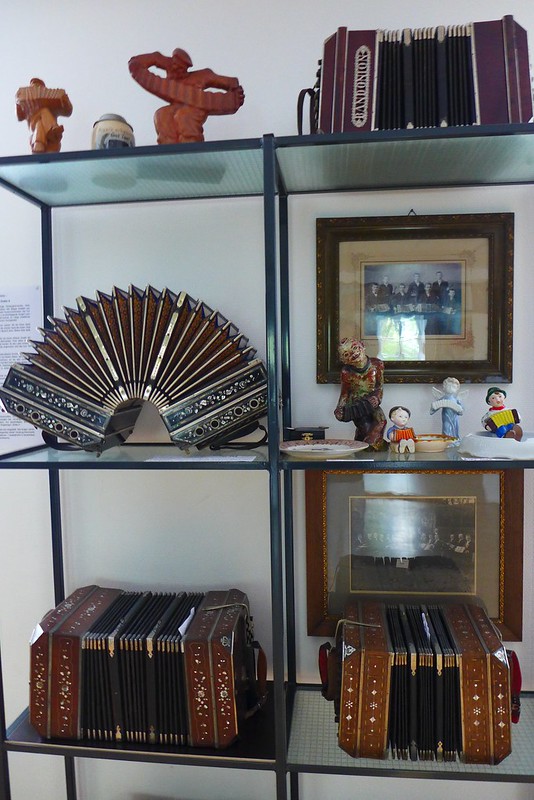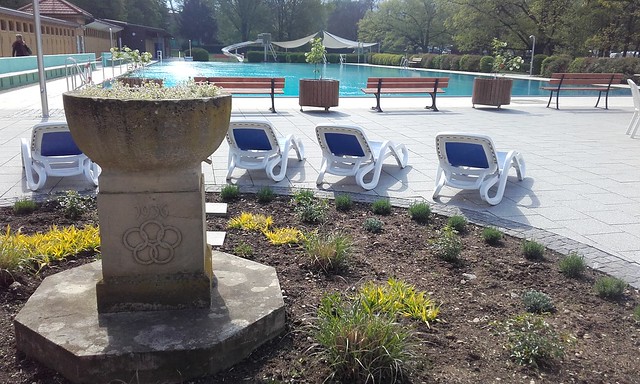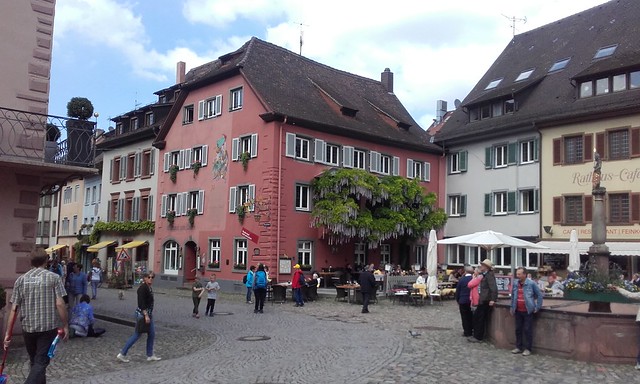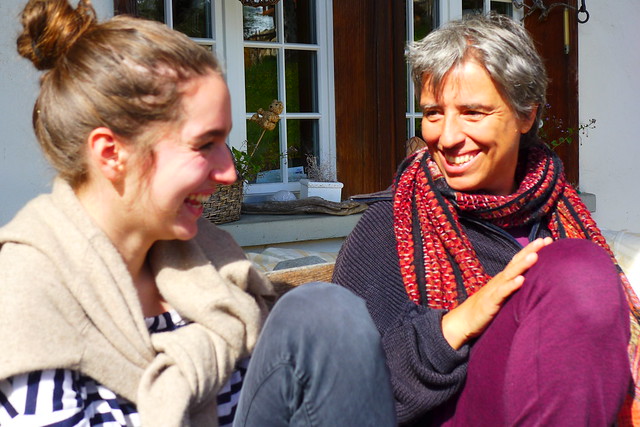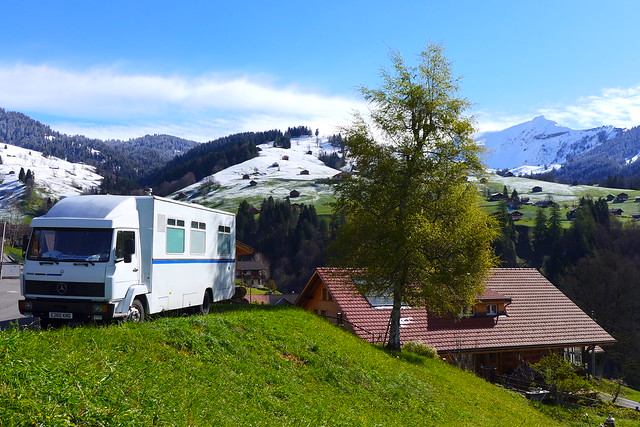The Poppy Fields of France
As we travel on north-westwards through France towards Calais, the land flattens out and opens up to large fields and forests. Every now and then we pass through a small town and in between we are on small but fairly straight roads. Along the side of the road, we notice more and more signs for war memorials and cemeteries – not just French but also German, American, Chinese, Canadian, British, South African, Australian…. it is a truly international scene that is represented here. We stop off somewhere in the middle of nowhere to watch a tank being off-loaded at a memorial location.
We wander around, reading the many panels telling the story of this place, how it was an important area, heavily fought over in both the first and second world wars. I look around. Fields as far as the eye can see, not even a house in sight. My mind cannot bend itself around the question of how so many men could be persuaded to fight against a people they didn’t know, on a piece of land they’d never set foot on before and in a country they had no connection with. When we were in Montesole, I could see why the partisans fought to the death: this was their home, it was mountainous, wild, beautiful and their families had lived there for centuries. But here, in Northern France? Flat countryside as far as the eye can see – I can understand a Frenchman fighting here, but why would a Canadian come and fight a German? I’m not talking politics, because of course that’s how it worked, but I’m talking about a heart-feeling. And it’s the same today, when British soldiers go off to fight in Afghanistan or elsewhere far away from home. Who or what gets people motivated to risk their lives in this way? Something in me cannot follow this line of thinking/feeling.
While we are driving through Northern France, I am also on an inner journey.
I am reading a series of books that my sister-in-law recommended to me, by Sabine Bode, who collected many interviews in Germany, researching the effects of war trauma and how this gets passed on down through the generations. For me, reading her books is like entering a cellar, the door of which has been kept firmly shut for many years. I recognise elements from my own childhood. The books mention a ‘fog’ that my generation and the after-war generation felt, a fog that prevented us from really enquiring when we were younger and that now obscures the memory of our childhoods. I remember how I tried to duck out from under a big heavy cloud ever since I was 7 or 8 years old, culminating in my decision to leave Germany and move to the UK in 1989. Bode makes a valid attempt at catching the inexplicable, retracing feelings back through the generations. I recognise various educational ‘methods’ she mentions, and I remember the strange volatile behaviour of my grandfather towards us children. I didn’t realise just how many of my personal childhood experiences were actually typical of my generation.
I remember seeing my mother under the direct influence of the strict and sometimes repressive atmosphere that came from my grandparents (born 1911 and 1914). If they came round for lunch (and as they lived nearby, this happened often), lunch had to be on the table by exactly 1pm – if not, my grandfather would throw a tantrum and storm off. This used to stress my mother considerably. Tantrums seemed to be the order of the day around meal times – as a 4-8 year old, my younger brother used to throw them regularly, usually culminating in him being dragged off to his room by my father, and the rest of the meal being conducted in silence, while my brother screamed and crashed around in his room. In my experience, my father was a peace-loving man, he rarely raised his voice and I only once saw him hit my younger brother, but he did have the idea that my brother’s choleric temperament was best cured by shutting him in a room on his own.
Dealing with my brother’s volatile nature took up a lot of space in our house and it was because of this, combined with the general sense of something heavy lying over the family, that I went my own way from very early on. I see this as a blessing. It gave me independence and a zest for life’s adventures. Even as a 7 year old, I saw the limitations of my home family and instead of fighting for it, I chose other households that gave me what I couldn’t have at home. I just chose another set of parents and siblings to spend my time with instead on those occasions.
Back to my grandfather, I remember that whenever we did ask him about the war, the stories he told were like fossilised vignettes, presumably those he thought we could handle, presented always with the exact same wording.
So much of our memory is coloured by how we respond to our environment though… Conversations with my older brother last year revealed that he’d experienced our grandparents’ home as a haven, as protective from the lack of emotional care he’d perceived from his parents. My experience of my parents and grandparents was diametrically opposite to his.
As the days pass, the books lead me deeper and deeper into the fog that I had chosen to turn away from so early in my life. One night I dream of a conversation with myself. I am split in two and one of me tells the other that I made a choice at the time and I still have a choice. I can look at this or leave it. The other me responds that there is a possibility that, by not addressing the past, I carry it with me and pass it on to my children. But, responds the first me, it is toxic material, will delving into it really bring me to a greater understanding or freedom? Is there not enough in the here and now to be attentive to?
Waking up from the dream, I think about the Here and Now. I think about those who are traumatised by wars today, and our inability as a group of nations that have war trauma still in living memory, to respond compassionately. We have so much space in Europe, we are so rich, why can we not share? Why can we not open the borders and help those in need? How can we stand by (especially the UK) and watch refugee children being further traumatised by drifting through Europe, unable to reach their families, due to border controls? And how can we leave orphaned children to their own fate?
After WW2, every second German was displaced. People describe this time in Germany as an ant heap, with everyone moving, in all directions. It was not only the time of war that left great scars but also the five years after, where hunger, displacement and loss of family left many people floundering and many children vulnerable to unchecked violence. Germany’s relative openheartedness, compared to other European nations, towards the current refugee situation may well have to do with the living memory of the time after the war.
Bode talks of the inability to heal trauma without an adequate grieving process. I suppose this is why we pass so many cemeteries of every nation on our way through northern France, each of them maintained by their respective countries. But what about these other memory spots, where tanks are displayed and the information boards make fighting sound like some exciting computer game. There is an element of glorification in this that makes me feel intensely uncomfortable. It is also partly the answer to my question above, of how so many men can be convinced into fighting.
There is much more to be said, but I feel a bit at sea with it all right now…
This chapter is unfinished and will remain so. Meanwhile, I will come back up for air. We are travelling towards Calais, we are heading for London to meet up with Lilli and the rest of the family, to be at her concert with the London Vocal Project.
*************
For more photos of this chapter, click here
Posted in Uncategorizedwith comments disabled.
Wiseppe, Val de Meuse, NE France
Not on many people’s itinerary but for me a rare opportunity to drop in on an old friend/work colleague and introduce Ruth to Terry Lee-Wright, formerly one half of Green Ginger UK, puppeteers extraordinaire – the other being Chris Pirie, who lives and works in Bristol – but now one half of Les Green Ginger France, the other half being his lovely wife Laurence (Lo).
I hadn’t seen them for 6 years – then on my way to Sweden, to present a commercial idea to sweet manufacturers, Lakerol, featuring Franco Bassetti and onwards to visit my oldest brother, Phil and his Swedish wife Eva. (I had worked with Green Ginger in various guises, notably as part of a festival put on by Carrefour in 1994 at all their major stores in France – we got lucky with Paris!)
Terry gives us a guided tour of their extraordinary home – an 11 metre tall converted barn, with spacious living quarters and a beautiful long garden, complete with shaded bar! Stepping into the work- space, with its green-screen and puppet workshop, is like entering an alternative universe: characters and posters from past shows seem to cover every inch of floor and wall space and yet there is still ample room for work benches, props and storage. The timing of our visit is ideal, as they are about to show a film they had made with nearby school children, to be followed by a performance of their current opus Petit’Tom, in a village some 30km away.
There is a tremendous buzz in the hall as we are all drawn into the strange world of Ormonz and it’s wonderful to see the children engaging with the characters and the imaginative journey they embark on. Nico, Terry and Lo’s 11 yr old son, is also a joy to be with and at home is keen for us to hear his guitar playing – a lively mixture of rhythm and melody with a distinctly Spanish flavour. The day after the performance we cycle to the river and spend some relaxing time taking in the unspoilt nature of the area and looking for fossils on the river’s edge.
I’m keen to accompany Terry and Nico on a trawl through three nearby vide grenier, something I miss whilst travelling, tho’ we don’t uncover any bargains – in fact, for me, the highlight is a small vintage car rally at one of the villages, featuring some beautiful old citroêns.
Otherwise, we hang out, enjoy some great meals together and catch up with each others’ news. Terry and Lo tell us of their imminent project, the nature of which they are struggling with, given the restrictions they face working in a high security prison, where their brief is to foster a better relationship between a small group of inmates and their children out in the real world. Research shows that there is 80% less chance of re-offending in cases where there is a meaningful relationship between prisoners and their children….we can’t wait to hear how this project goes.
******
For more photos taken during our time in Wiseppe, click here
Posted in Uncategorizedwith comments disabled.
Along the Moselle
We leave Ungersheim at 4pm and travel westwards, circumventing most of the Alsace/Vosges mountains until we reach the source of the Moselle, which we follow along until dark, when we reach a little town called Charmes, although it has precious little of it. There is a camperstop, so for a few Euros, we find ourselves surrounded by ‘plastic fantastics’ for the night, as we call the campervans that have all the mod cons that we don’t, such as television, satellite dish, toilet, shower, etc. We catch up on UK news, these days mostly not a very pleasant experience as it tends to be “find out what other outrageous scheme has our darling prime minister cooked up since we looked last”. When will we learn not to do this just before going to bed, I don’t know… it give us nightmares. This night, I have persistent bad dreams, of people shouting at each other, fighting… a war-like situation…
The next morning, Frank tells me, people were indeed shouting until about 3am right outside our Emma, a group of drunks hanging out under the vaults of a little building that houses showers and toilets for the campers. Well, you never know what the nights are going to be like and you have to take the good with the bad when you are travelling. In a van, you are a bit vulnerable to boy racers practising their handbrake turns, or drunks, or people otherwise up to mischief in the car park that you thought you’d have a quiet night in. On the other hand, sometimes you are parked up with the same view that you’d pay hundreds of pounds for in a hotel room.
The next morning, the sun beats on our Emma, so despite a night of broken dreams, we rise early to do our Yoga before it gets too hot. I have a lot of admin to do, so after breakfast, I put a table outside and buckle down to it until 3pm. It’s great to have a portable office, always with a different view!
We set off into the afternoon sun, continuing our travels along the Moselle until Toul, at which point we veer off into the countryside, heading for Lac Madine, following little but straight roads through fields and fields of green and yellow (rape is in full blossom).
About an hour before sunset, we arrive at Lac Madine. There is a huge car park but just a few vans are dotted about the place. A family with three children sits outside one of them and once we have settled in they visit us, curious to see Emma from the inside. They only live a few kilometres down the road, but if the weather is nice, they sling dinner in a bag, pile into the camper and come down to have a meal by the lake. The boy is full of bouncy energy, eager to help with cutting the wood for our stove. There’s a lovely father & son moment, when they saw the logs together..
Thankfully this night’s sleep is accompanied only by nightingales, so we sleep soundly and set off early the next morning, after a quick swim and a yoga session by the lake.
Posted in Uncategorizedwith comments disabled.
Transition Town Ungersheim
True to his promise, Mr. Mensch had made a space in his timetable to meet us and show us around his town. We started off in the town hall where we met Haida, the new assistant, who was to come with us on our trip around town, and over a cup of tea, we had a chance to ask questions and chat about the general idea behind the transition town concept. The idea is to move the town towards a state of independence from oil, on all levels, starting from Transport, via fuel and general consumption, to a more sustainable way of living on an ecological level. Mr. Mensch talked about three central areas that are the supporting pillars: freedom of the mind, freedom of economics, freedom of food production. All areas are interlinked.
Although Ungersheim is small (2400 inhabitants), the projects are large and built to last, and there are many of them (here is a link that describes them better than I could do). It is palpably different if a local government is the driving force behind such a movement, compared to Totnes where people have to find their own resources and spend time and energy to convince the local government. I suppose here, the local government has to spend time and energy to bring the population on board the project, but it seems like it really is working.
What we couldn’t find in the brochure was any evidence of a cultural centre, any kind of hub, and when we ask Mr. Mensch about it, he says the town hasn’t got one. But then we climb into his car to visit the various projects and we find out that every single project he shows us is created by the people for the people and there is no shortage of large communal spaces indoors and out. I guess something must have got lost in translation, or maybe the French take for granted that every little town has their own large sports complex, cultural centre, theatre space etc.
In the case of Ungersheim, there is a huge sports hall with a large meadow outside that is going to be transformed into a space where, in cooperation with the surrounding residents, low impact structures will be built with living, vegetal materials such as willow; there is a Dojo for Karate etc., a school kitchen supplying meals with locally sourced ingredients for 7 schools, a swimming pool, a primary school and Kindergarten and a cultural centre which houses a library, various administrative offices, a meeting space for older people and a theatre. All of these buildings are heated by one large wood-fired boiler system. All of them have solar panels that supply them with enough energy for their electricity (in France, extra electricity produced can but doesn’t have to be fed back into the net).
Next, we visit the Passive Housing project, where Mr. Mensch tells us that the council bought a piece of land from a rich Swiss landowner, thus pre-empting speculative development on the fringe of their town, and made strict conditions of sale. They ‘wasted’ two years through trying to create an association instead of offering private ownership, but once this was changed, people applied and built their own houses according to the ecological conditions imposed by the council.
The buildings are arranged around a previously existing stone building that can now be used for communal activities.
Once more, we climb into the car and drive to the most recent project, (parts of it about to be opened in a month or two) a market garden, created in the old potassium works on the edge of the town. Over 30 people work here, providing vegetables for a veggiebox system, as well as supplying 50% of the school kitchen’s fruit and vegetable requirements. The new buildings will house a cool store, a market garden kitchen that will process any surplus into soups, jams, pickles etc., a canteen for the workers, and eventually there will be a wood fired baking oven, a fruit press and a micro brewery too. All buildings, needless to say, are built to highest ecological standards and in this project, various sustainable building methods from around the world are showcased. One part of the old potassium works have been transformed into the market garden, another part is being left wild for nature to reclaim it. A nature walk leads through that part which unfortunately we didn’t have to the time to explore.
We wonder aloud, who pays for this incredible project? Mr. Mensch says the council foots the bill, with some regional and national help. The idea is to get it up and running and then have it maintained by an association. I ask if the project will pay back the initial investment, and he says they will but not in monetary terms. The payback will be one of human value to the town. It brings employment, it regenerates an abondoned area, it produces organic local food. With a smile on his face he says, this is one of my more crazy projects.
Our time slot with him is up, the mayor has to return to his office… he heartily shakes our hands and asks us to convey his greetings to Rob Hopkins should we meet him on our return to Totnes.
One person in a position of power, with charisma to convince people of his ideas, and with tenacity (he’s been Ungersheim’s mayor for 20 years) – the difference this can make to a town is impressive and inspiring. What a Mensch!
For more photos on this chapter, click this link
Posted in Uncategorizedwith comments disabled.
Mulhouse
We cycle into town to find a local internet café and after a frustrating search end up in a Starbucks to catch up with email etc. Back at Emma, Ruth decides to bring our blog up to date while I am tempted by the Cité de l’Automobile, purportedly the largest car museum in the world and put together over a number of years by two fanatical brothers called Schlumpf (Ruth tells me this is the German name for Smurfs and so can’t get her head around the idea of a serious museum with that name).
For a lover of old cars like myself, it doesn’t disappoint and is indeed of epic proportions. Apart from the largest collection of Bugattis in existence, it features all classes of mainly European cars, from the earliest days of motoring to the present day; from family saloons to Formula 1! Having been the proud owner of a Citroen light 15 – the traction avant – I was delighted to find a number of pristine examples, especially one, that for a price, one could drive six times around the track: an extravagance I know but an experience I find impossible to resist.
Later, there is a historical procession on the same track, favouring Renaults, Citroens and Peugeots, with an accompanying commentary full of humour and with the drivers dressed according to the age of the cars. I return to Emma satiated but mindful of the fact that in the morning we’re meeting the leader of a transition town intent on weaning his community away from oil dependency!
Posted in Uncategorizedwith comments disabled.
The Eco Museum in Alsace
It has rained all through the night, so this morning the ground is wet, but luckily the Eco Museum has an undercover entrance where we can do our yoga before it opens.
We then spend the day walking around the museum, utterly charmed by it. Although the houses have been brought here from all corners of Alsace, much thought has been given as to the grouping of houses and the result is fantastic. All in all there are over 70 houses in different little hamlets, well documented and beautifully re-erected.
Inside, one can visit different professions, from Blacksmith and Wagoner, potter, baker, cobbler and barber to the various farm buildings housing goats, donkeys, pigs and ducks. Many people, dressed in traditional clothing, go about the traditional professions or way of life: a family is cooking and having their lunch, a violin maker is making pegs in his workshop. We sample freshly distilled schnaps and bread straight from a huge wood fired oven, and jump onto a horse and cart that take us to the outskirts of the village into the fields and back. There are storks everywhere, ponderously crossing the paths and eying up little critters in the fields. I am envious of their ability to balance so graciously on one leg while bending their heads down to pick something up from the ground – my yoga-tree pose leaves much to be desired in this respect!
For more photos of this chapter, click here
Posted in Uncategorizedwith comments disabled.
Off to France
From Staufen, we make our way via Freiburg into France. We intended to go to a class or two and a Milonga in Freiburg, but the costs are prohibitive at 25 euros per person, so we restrict our extravagant outing to just the Milonga, still at 15 Euros each.
Southern Germany is a lot richer than the North, it seems. The Milonga unfortunately is nothing much to write home about. It’s not too bad, but it’s not very friendly either. Coming from Italy, where we were heartily welcomed wherever we went dancing, it’s a bit of a downer, so we don’t last too long before heading back to Emma, parked in a quiet, leafy road in a rich suburb of Freiburg.
The next morning, we make our way across the Rhein and into France, choosing a route that leads across a little bridge not really meant for heavy vehicles, and past a large EDF turbine and a nuclear power station. Just when we realise that the border control will of course know that we crossed a 3.5t bridge with a 7.5t lorry, we are in France – without having gone through any visible border at all!
We wend our way through little lanes to Ungersheim, a little town in Alsace which, in recent years, due to a documentary called ‘Qu-est-ce qu’on attend?‘, has become known as a Transition Town (do click this link, it’s got a lot of info about the village) with an ambitious programme. The driving force is the mayor, Jean-Claude Mensch, who kindly opens the town hall doors to us on a Saturday morning when we knock on a locked door. We are lucky to find him there. He’d just conducted a wedding ceremony for a gay couple, otherwise we would have had to wait until Monday. When he hears that we are from Totnes, the first Transition Town, Mensch generously donates his precious free time to explain the various projects to us, until he gets a phone call from his wife asking him to come home for lunch. He suggests we come back on Tuesday when he would have time to show us around his village. He gives us a number of recommendations as to what to do in the interim days, top of the list being the Eco museum not far from Ungersheim.
We arrive at the Eco museum to find a beautifully quiet and leafy car park. Rain sets in, so we light a fire, make some food and have an early night, listening to the nightingales as we drift off into dreamland.
Posted in Uncategorizedwith comments disabled.
Staufen
On our way down the Habkern mountain, we discover that the clutch pedal is not working properly. Frank has to winkle it off the floor with his foot every time he changes gear. Oh no! We’ve had this once before and it led to weeks in a Spanish garage waiting for a replacement clutch plate. But now as then, I’m not convinced it’s the clutch plate, I rather think it’s some kind of blockage in the pipes and this gets confirmed when we use our ‘phone a friend’ option and ring Walter, our German Mercedes mechanic in England. What’s more, he doesn’t think it’s going to harm us or the vehicle to continue on our journey, so we drive all the way to Staufen, a little town in Germany not far from the Swiss border. By the time we arrive the problem has literally dissolved.
Those who follow our blog regularly will remember Staufen from a chapter a couple of months ago, when I went there with Ines to teach a Tango workshop and we both were very impressed by this young and enthusiastic Tango community that also hosted a Bandoneon museum (I have a plan that involves Bandoneons – more of that later when it comes to fruition – and as we were passing through, I wanted to check out a few things).
I like Staufen. Apart from the fact that it is a very picturesque old town, a lot of little things talk of a place where people enjoy living. We park up on the central car park, which has clear signs against large vehicles, and go dancing at the local evening Milonga. Nicole, our Tango friend, tells us that Frau Mueller, the traffic warden, may well come and talk to us. Sure enough next morning (at a respectable time, mind you), Frau Mueller knocks on Emma’s door. You can’t stay here, you are too big for this car park. We pleasantly chat for 5 minutes and she gives us info on where we can go instead, which is only a short cycle ride out of town, so no problem for us.
Our new car park is by a beautiful lido built over 100 years ago. A listed building, it boasts a 50mtr long olympic-size swimming pool and cute changing cabins by the side. There is a statue that speaks of its first general overhaul that happened in time for the 1936 Olympic games in Muenchen. Recently, funds for the pool dwindled and closure was imminent when a group of volunteers stepped in and kept the facility alive for everyone. It is open from May 1st for the hardy ones, so for 3.50 Euros we have the joy of going into pristine, ice-cold water. It was so cold that I couldn’t really feel it but my swimming slowed down on the second length due to my muscles seizing up! We felt really alive after that.
We cycle into town to sort out This and That…. on the way, we come past an older woman who is meticulously brushing leaves off the road outside her house. When we come back four hours later, she is still in exactly the same spot, still brushing, and I realise there is more to this than the need for a clean road. I imagine her there, brushing and brushing every day of the year and the people around her allowing her the space to do so without making her feel like an outcast.
Nicole lives in a little house in the town centre, in a part where people sit outside their houses on benches, enjoying the first proper warmth of the year, or outside the pub, having a glass of beer and a chat with a friend on a Friday afternoon before heading home for the weekend.
Staufen has leisure, enjoyment of life, an unhurriedness and an acceptance. The traffic warden could have treated us very differently, and people could treat the old lady with the brush very differently, but there is a ‘live and let live’ feel about the place.
Posted in Uncategorizedwith comments disabled.
Habkern
It is almost exactly one year on from when Frank and I visited Habkern with Emma last, and much has happened since then. My brother, who then was very ill but still at home, died two months later, and shortly after that, his first grandchild was born. He’d so much wanted to meet his first grandchild (and what a lovely child he is!) that I just hope they met each other somewhere along the way – one coming and the other one going…
We have no plans other than catching up with everyone, so we hang out and talk a lot, we follow Karin and Rahel around while they go about their daily business, working in the garden or going on a shopping trip, all the while trying to catch moments when we can ‘help’ by holding Aaron 
Little Aaron is a complete delight and it is a joy to watch Rahel settling into the role of mother while at the same time not losing herself.
At night, we are joined by Klichko the cat who hops into our bed and wedges herself between us. So many things speak to me of the last few times I spent with my brother. We didn’t have an easy relationship all through our lives, but it dramatically changed for the better during the last year. I like to remember him like that – when he proudly showed me his garden or, once in hospital, when he talked about detailed plans of which flowers/vegetables to plant where. When he lay resting on the sofa in the living room, with Klichko purring on his chest, and we connected on a heart level without having to talk at all.
The house and garden in Habkern is a world in itself. It is beautiful and life has not stopped in the last year. There is of course sadness and a feeling of a hole, an absence, but also the will to connect with life, to grow, to change and develop.
Every time I’m in Habkern, I feel there is another channel of communication alive, in addition to the usual one of conversation. There seems to be a dream-like, subconscious level, in which I connect with people and the place, and I feel that especially Karin is actively present in that level. I can’t really pinpoint what it is, but it has to do with healing, nourishment, love.
Karin offers us to take some mint from her garden, so I prepare a pot for our hanging herb basket in Emma, taking a little piece of Habkern earth and plant life with us. In turn, we leave some traveller’s gifts with them – Orange marmalade and Sicilian olive oil.
After a few days of immersion in this nourishing environment and a mutual exchange of heart energies, we pack our Emma, bid a fond farewell and move on northwards.
Posted in Uncategorizedwith 2 comments.
Good bye Italy, Hello Switzerland!
We leave Bergamo mid-afternoon with the intention of finding a place to stop for the night as soon as possible. We’ve become a bit more choosy as to where we want to stop, as it needs to be somewhere that’s suitable for an outdoor Yoga session. Normally we do the Yoga first thing but this morning, the fishing competition interfered, so as we drive along, we keep an eye out for a parking place with a bit of green by the side. But there is no suitable space in sight as we wind our way from Bergamo to Como. We try a little detour off the main road, but this only leads us into incredibly steep hills and into Como through the back door. We then try to manouvre our way through Como and out the other side, which takes quite a while and following the signs seems to lead us rather round the houses, so that by the time we hit the motorway to head out of Italy, we are both tired and cranky. At the border, we need to fill in the forms and pay for the motorway toll. We are both so tired that we can’t properly communicate with the official, our heads a mess of different languages and our mouths not obeying either idiom. He just looks at us and shakes his head…
15km north of Como, just across the border into Switzerland, we turn once more off into the hills, following directions to a campsite. We arrive to find the barriers down, so we end up parking on a meadow just outside the campsite. We are both completely worn out from squeezing Emma through uncountable serpentine turns, navigating heavy traffic up and down steep mountains. It is rare for us to have to drive around 2 hours trying to find a place to park for the night!
The meadow is quiet and lets us come to rest. I am determined to do the Yoga, no matter how tired, and I find that doing just 20 minutes outside actually restores my energy very nicely, more than food or rest could have done.
That night I sleep like a log.
The following morning, we leave early and after 4 hours of smooth driving, we arrive in time for lunch at Habkern, 1100mtrs up above Interlaken in the heart of Switzerland, where my sister-in-law Karin, my niece Rahel and her little baby Aaron await us.
Posted in Uncategorizedwith 2 comments.
